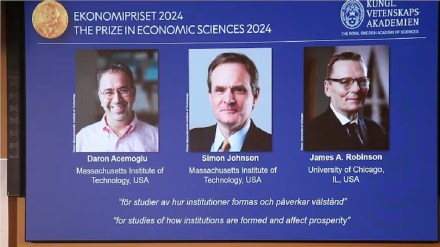By Ritwik Sharma
The 2024 Nobel economics prize has been awarded to three US academics — Daron Acemoglu, Simon Johnson, & James A Robinson — for their research on the importance of societal institutions for a country’s success or failure. Here is the break down of their seminal work on prosperity gaps
Who are the Nobel economics prize awardees?
The nobel memorial prize in economics was awarded on Monday to Daron Acemoglu, Simon Johnson and James A. Robinson for research into differences in prosperity between nations and why global inequality persists, especially in countries beset by corruption and under dictatorships. Acemoglu, who was born in Istanbul and studied in the UK, and Johnson are professors at the Massachusetts Institute of Technology. Robinson, also a British-American like Johnson, is director of the University of Chicago’s Pearson Institute for the Study and Resolution of Global Conflicts with a specialism in the economies of sub-Saharan Africa and Latin America.
Much of this research work formed the basis of Acemoglu and Robinson’s 2012 best-selling book, Why Nations Fail: The Origins of Power, Prosperity, and Poverty, which explores the roots of inequality and and why some countries successfully gain wealth and influence. Last year, a book by Acemoglu and Johnson surveyed a thousand years of technology in terms of their success in creating jobs and spreading wealth.
Why have they won the award?
The trio were commended for their work on “how institutions are formed and affect prosperity”, the Royal Swedish Academy of Sciences said on Monday. “Reducing the vast differences in income between countries is one of our time’s greatest challenges. The laureates have demonstrated the importance of societal institutions for achieving this,” said Jakob Svensson, Chair of the Committee for the Prize in Economic Sciences. “They have identified the historical roots of the weak institutional environments that characterise many low-income countries today,” he told a press conference.
The richest 20% of countries are now around 30 times wealthier than the poorest 20%, the Nobel committee noted in its statement, with the former expanding its wealth while the latter segment of nations fails to close the gap.
Takeaways from their body of work
Their research developed the empirical and theoretical case that differences in economic institutions are the fundamental reason behind the differences in economic development while political institutions determine the constraints on and the incentives of the key actors in the political sphere. Examples of political institutions include the form of government, for example, democracy versus dictatorship or autocracy. They illustrated the assumptions, the workings and the implications of this framework using a number of historical examples.
As economist Madan Sabnavis writes in Indian Express, “The two main takeaways from their body of work is the importance of a democratic set-up and the creation of the right institutions that foster investment.”
Much of these findings are captured in Why Nations Fail (2012) co-authored by Acemoglu and Robinson where they argue that inclusive economic and political institutions are crucial for economic prosperity. The book also cautions that China would not be able to sustain economic growth and may face a similar collapse to the Soviet Union.
More than a decade later, Acemoglu has said that China posed a “bit of a challenge” to their argument as Beijing had been “pouring investment” into innovative areas like artificial intelligence and electric vehicles. But, he opined, that authoritarian regimes would have a harder time in achieving long-term, sustainable innovation outcomes.
Other notable works
Acemoglu and Johnson in Power and Progress: Our Thousand Year Struggle Over Technology and Prosperity (2023), argue that technological innovations over a millenium have tended to benefit the elites, rather than lead to prosperity for all. They warn that “the current path of AI is neither good for the economy nor for democracy”. In The Narrow Corridor: States, Societies, and the Fate of Liberty (2019), Acemoglu and Robinson examine the historical development of rights and liberties in nation-states. The book suggests that liberal-democratic states exist somewhere between the alternatives of anarchy and authoritarianism. The state is required to protect people from being subjugated by some section, but it can also become an instrument of violence and repression. Liberty grows only when there is a delicate balance of state and society.
How their view differs from others?
The economists have advanced a new theory which differs from a conventional view that accords importance to climate, geography, or culture to lend greater thrust on institutions. Their research holds lessons for policymakers on the importance of inclusive institutions as a foundation of long-term growth. As the Royal Swedish Academy of Sciences noted, “Societies with a poor rule of law and institutions that exploit the population do not generate growth or change for the better. The laureates’ research helps us understand why.”
